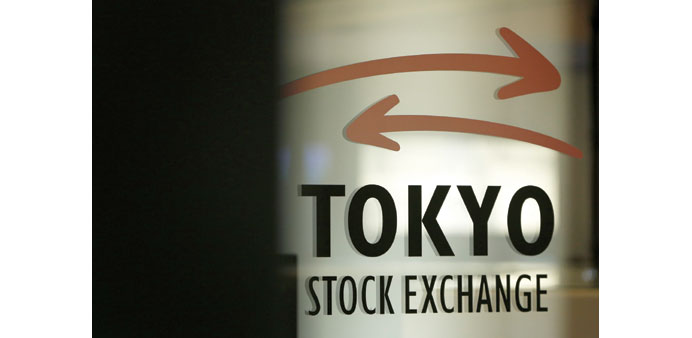A slew of US and Japan data to be released in the coming days will be key trading cues for Tokyo investors after both countries’ central banks rolled out fresh policy moves
AFP
Tokyo
A slew of US and Japanese data to be released in the coming days will be key trading cues for Tokyo investors after both countries’ central banks rolled out fresh policy moves last week.
On Friday, the Bank of Japan (BoJ) announced surprise tweaks to its huge stimulus plan, jolting financial markets and pushing the yen into a brief dive, as Japan’s economy struggles to mount a recovery.
The decision came days after the Federal Reserve hiked interest rates for the first time in almost a decade on the back of a firm US economy.
The moves highlighted a growing divergence in monetary policy between the US central bank and its overseas counterparts.
This week, investors will be keeping an eye on some key US data, including economic growth figures and existing US homes sales, after the Fed rate move boosted hopes the world’s top economy was back on track.
“Investors are keen to confirm the health of the US housing market,” Nomura Securities said in a commentary.
In Japan, markets will be looking at inflation, jobs and spending data later in the week after the BoJ tweaked its massive stimulus plan on Friday.
Among the moves, the bank said it would boost its holdings in firms dedicated to capital spending and new hiring.
They also made some other tweaks—including hiking the bank’s exposure to longer-term bonds—after wrapping up their last policy meeting of the year.
The announcement comes as analysts raise concerns the BoJ would struggle to scoop up enough bonds under its ¥80tn ($654bn) annual asset-buying scheme—which effectively prints money to spur lending.
BoJ chief Haruhiko Kuroda said that the measures announced Friday were designed to beef up the impact of the bank’s monetary easing on the economy.
The benchmark Nikkei 225 index briefly rallied more than two%—it was in negative territory during morning trade—as the yen sharply weakened, boosting exporters. But the jump quickly faded and the Nikkei fell 1.90%, or 366.76 points, to close at 18,986.80. It lost 1.27% over the week.
The broader Topix index of all first-section shares dropped 1.76%, or 27.61 points, to 1,537.10. It was down 0.80% this week.
“Investors thought that the impact of the (BoJ) measures was likely to be limited,” IwaiCosmo Securities broker Toshikazu Horiuchi told AFP.
“But at least it’s true that the Bank of Japan still intends to sustain the economy with abundant cash, which marks a sharp contrast to the Fed.”
Tokyo’s losses tracked a sharp decline on Wall Street as the rout in oil prices pummels petroleum-linked equities again, with JX Holdings down 3.74% at ¥491.3 and Inpex losing 2.6% to ¥1,141.
Toyota fell 0.58% to ¥7,658, Nissan dropped 1.64% to ¥1,257 and Sony sank 2.58% to ¥2,998.5.
On currency markets, the dollar weakened to ¥121.83 from ¥122.60 in New York on Thursday. It had jumped over ¥123 right after the BoJ announcement.

